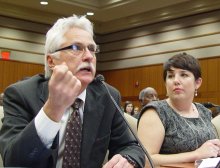Proposed BESE rules don’t inform parents or guarantee proper use of state funds

View the LFT presentation to BESE here.
(Baton Rouge – October 25, 2012) Private and religious schools that receive state funds through vouchers should be held to accountability standards comparable to public schools, Louisiana Federation of Teachers President Steve Monaghan said today.
“We believe that vouchers are a bad education policy, period,” Monaghan said. “But as long as they remain law, parents should have the information they need about the schools, and taxpayers should be satisfied that education dollars are being spent appropriately.”
Rules currently being considered for participation in the voucher program do not meet those standards, Monaghan said.
“When the Board of Elementary and Secondary Education voted on Bulletin 133 last July, they adopted a document riddled with loopholes and inconsistencies,” Monaghan said. “We urge BESE to correct its flaws before finally adopting these criteria for schools to participate in the voucher program.”
The LFT president noted that a stated goal of the policy calls for a “common standard for student performance across traditional public, charter public and non-public schools,” and suggested a number of changes that will help make the rules achieve that benchmark.
The first change proposed by the Federation would revoke the blanket authority of the state superintendent of education to waive any of the rules governing schools that accept vouchers.
“One paragraph says the rules require an accountability system, but the next one says ‘the state superintendent may waive any provisions of this Chapter’,” Monaghan said. “One person would have the ability to set aside accountability for schools that take public funds, and that is wrong.”
The Federation suggests a formal process that includes exact criteria for obtaining a waiver, a public hearing and official action by BESE to approve a waiver.
In a similar vein, Monaghan said, the policy should replace the word “may,” which is sprinkled throughout the document, with the stronger verb “shall.”
“The policy’s plague of ‘may’ instead of ‘shall’ must be addressed,” Monaghan said. “In four pages, the permissive language is used 13 times. That guarantees there will be at least the perception of disparate treatment for some voucher schools.”
For example, BESE’s policy says that voucher schools that show “evidence of gross fiscal irresponsibility, may result in penalties including the school being declared ineligible to participate.”
“There should be no ‘may’ about it,” Monaghan said. “It should say schools that cheat ‘shall’ be declared ineligible.”
In order to guarantee that students in voucher schools receive appropriate instruction, Monaghan said, BESE needs to address the curriculum of participating schools.
“Do we really want the state to pay tuition at schools that ‘teach’ via TVs and DVDs, schools that include instruction about the benefits of the Ku Klux Klan, and schools that proclaim the Loch Ness Monster to be living proof that evolution is false?” Monaghan asked.
Monaghan urged BESE to require schools to adopt and implement common core curricula aligned with state content standards for voucher recipients, and to make an annual review of voucher schools to ensure the academic competence of the schools.
The entire presentation and list of suggested changes may be viewed here.
Thursday’s hearing was held as a result of an LFT request under the Louisiana Administrative Procedures Act, which governs the way state agencies are allowed to pass new rules.
According to the APA, after initial BESE approval of a new rule, the next step towards final adoption is to publish the proposal in an official document called the Louisiana Register. The publication triggers the time for public comment and request for a formal public hearing to consider changes to the rule prior to the Board's final action.
BESE took its first vote on the proposed Bulletin 133 on July 24. Opponents of the proposed rule were disappointed when BESE allowed them only three minutes to make their case and to suggest improvements.
